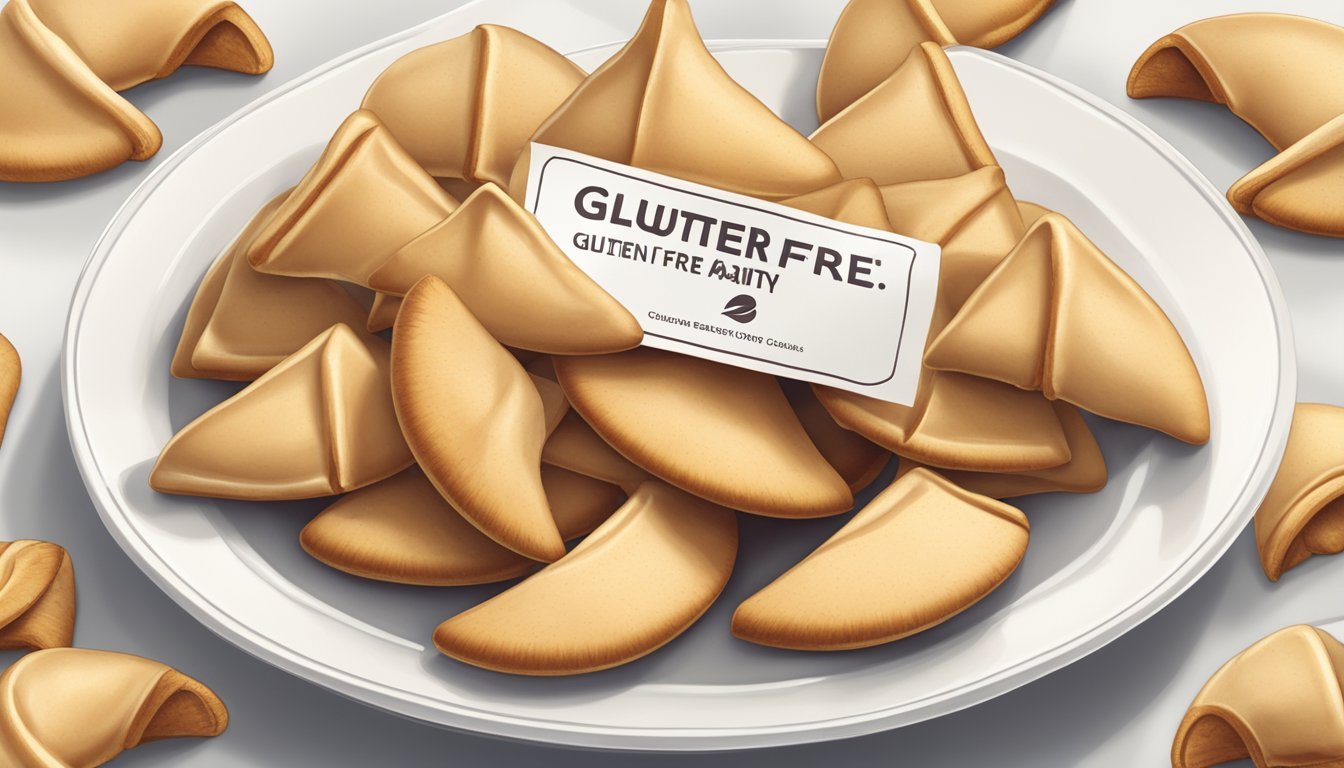Are Fortune Cookies Gluten-Free?
Unveiling The Truth About This Popular Treat
Traditional fortune cookies, the crisp cookies that often conclude a meal at Chinese restaurants with a slip of paper bearing a prophecy or aphorism, typically contain gluten. The primary ingredient in the classic fortune cookie recipe is wheat flour, which is a source of gluten. Therefore, for individuals with celiac disease or gluten sensitivity, the standard fortune cookie poses a risk and should be avoided.
However, with the increased awareness and dietary restrictions surrounding gluten, alternative recipes for gluten-free fortune cookies have emerged. These recipes substitute wheat flour with various gluten-free flours such as rice, corn, or a blend of gluten-free alternatives. The resulting cookies aim to replicate the texture and taste of traditional fortune cookies while providing a safe option for those who are avoiding gluten.
It is worth noting that while gluten-free fortune cookies are available, most are not made this way by default. Consumers seeking gluten-free options must specifically look for restaurants that offer them or purchase from specialty bakeries that produce gluten-free goods. The availability of gluten-free fortune cookies makes it possible for more people to enjoy this experience without concern for gluten-related health issues.
Understanding Gluten
In addressing gluten's role in diet and health, it's imperative to dissect its nature and the conditions associated with its consumption.
Overview of Gluten
Gluten is a family of proteins predominantly found in grains such as wheat, barley, and rye. It acts as a binder that holds food together, providing elasticity and a chewy texture. It's a common component in breads, pastas, and many processed foods. Individuals without dietary restrictions may consume gluten regularly without adverse effects; however, it becomes a serious concern for those with gluten-related disorders.
Celiac Disease and Gluten Sensitivity
Celiac Disease is an autoimmune disorder where the ingestion of gluten leads to the damage of the small intestine. It affects about 1 in 100 people worldwide. Signs of celiac disease can vary and may include digestive discomfort, anemia, and fatigue. A strict, lifelong gluten-free diet is the only current management for those diagnosed.
Gluten Sensitivity, also termed non-celiac gluten sensitivity, describes individuals who experience symptoms similar to celiac disease when consuming gluten but do not have the associated antibodies or small intestine damage. Symptoms may improve on a gluten-free diet. Moreover, some may suffer from a wheat allergy, which is an allergic reaction to wheat proteins, and may also require avoidance of wheat in their diet.
The Basics of Fortune Cookies
The iconic fortune cookie, usually served at the end of meals in Chinese and Asian restaurants, is a sweet treat coupled with a piece of paper featuring a prediction or aphorism. Its distinctive shape and hidden message contribute significantly to the dining experience.
History and Origin
The notion that fortune cookies originate from ancient China is a common misconception. In truth, they were invented in the early 20th century and popularized in America. The creator of the fortune cookie is often attributed to David Jung, founder of the Hong Kong Noodle Company in Los Angeles, although its origin has multiple claims.
Traditional Ingredients
The classic fortune cookie recipe requires a few simple ingredients: wheat flour, sugar, water, and egg. To create the batter, these ingredients are combined until smooth. The batter is then baked in an oven until it reaches a golden hue. The cookies are quickly molded into their traditional shape while still warm; this process must be done swiftly as the cookies become crisp and brittle upon cooling. The traditional recipe is dairy-free, typically uses a hint of vanilla for flavor, and is not gluten-free due to the presence of wheat flour.
Gluten-Free Fortune Cookies
Responding to dietary restrictions and the rising demand for gluten-free products, gluten-free fortune cookies offer a delightful treat without the gluten. This section provides an overview of gluten-free options and highlights reputable brands crafting these cookies.
Introduction to Gluten-Free Options
Gluten-free fortune cookies are typically made using alternative flours such as rice flour or cornstarch to replace traditional wheat flour, which contains gluten. Manufacturers adhere to strict quality control measures to prevent cross-contamination, ensuring that the gluten-free label stands true. Emphasis is placed on achieving the same characteristic taste and texture that one expects from a conventional fortune cookie, while making it safe for individuals with gluten intolerance or celiac disease.
Alternative Flours Used:
Rice flour
Cornstarch
Xanthan gum (for texture)
Quality Control Measures:
Dedicated gluten-free production lines
Regular testing for gluten traces
Segregated storage and utensils
Popular Gluten-Free Brands
Certain brands have distinguished themselves in the market by offering high-quality gluten-free fortune cookies. These brands ensure their products are gluten-free not only by utilizing gluten-free ingredients but also by preventing cross-contamination in their cooking process.
Notable Gluten-Free Fortune Cookie Brands:
Brand A: Known for organic ingredients and non-GMO certification.
Brand B: Offers a variety of flavors and uses certified gluten-free flour.
Brand C: Renowned for artisanal methods and small-batch production for freshness.
These brands have gained popularity not only for their commitment to being gluten-free but also for maintaining the integrity and enjoyment of this traditional treat.
Making Gluten-Free Fortune Cookies
Crafting gluten-free fortune cookies involves substituting traditional wheat flour with gluten-free alternatives, meticulous preparation techniques, and precise baking to achieve the characteristic crispy texture. This section delves into the choice of gluten-free ingredients, methods of preparing the batter, and the baking process.
Gluten-Free Ingredients
To replace conventional flour, various gluten-free options can be employed to maintain the structural integrity of fortune cookies. A common choice is a blend of rice flour and cornstarch to mimic the texture of wheat flour. Xanthan gum may be added as a stabilizer. Alternatives like almond flour can also be used for a richer flavor. Essential ingredients for the gluten-free batter typically include:
Gluten-free flour (rice flour or a mix)
Cornstarch
Xanthan gum (optional, as a binder)
A small amount of salt
Granulated sugar
Egg whites (to help create crispiness)
Neutral-flavored oil, like canola
Water
Vanilla and almond extracts for flavor
Preparation Techniques
The key to a quality gluten-free fortune cookie batter is in careful preparation. One starts by whisking dry ingredients such as gluten-free flour, cornstarch, and salt. In a separate container, liquids like egg whites, water, oil, and extracts are combined. These are then gently folded into the dry ingredients using a spatula, careful to not overmix to preserve the lightness essential for a crispy outcome. Before baking, fortunes written on small strips of paper should be prepared.
Baking Process
Baking gluten-free fortune cookies requires attention to temperature and timing to achieve a proper crispiness. Preheat an oven or griddle to around 300 degrees Fahrenheit. Spoon dollops of the batter onto the preheated surface, spreading thinly into circles. Bake until the edges brown slightly, which indicates they are ready for shaping. Working quickly and carefully to avoid burns, one must place a fortune in the center of each cookie, fold it in half, and then bend it over the rim of a mug or the handle of a wooden spoon to achieve the characteristic fortune cookie shape. Finally, the cookies should be placed on a cooling rack to harden into their iconic form.
Customizing Fortunes
Customizing the fortunes inside fortune cookies allows individuals to infuse personal touches, whether it's for a special event or just for a bit of fun. Messages can range from witty quips to personalized predictions that reflect the creator's intent.
Creating Personalized Messages
Personalized fortunes offer a unique way to convey messages, whether one's aim is to provide wisdom, share a funny joke, or make a lighthearted prediction. To create personalized messages, consider the following guidelines:
Length: Keep each fortune brief, ideally fitting within 3 lines.
Characters per line: Aim for a maximum of 32 characters per line.
Instructions: Give clear instructions regarding the use of backslashes or the enter key to indicate line breaks.
One might engage in crafting small paper fortunes, cutting narrow strips of paper, and carefully typing or handwriting the custom messages.
Fun and Creativity in Fortunes
Fortunes inside cookies serve not just as predictions or words of wisdom— they are a source of entertainment. Embracing creativity can lead to a range of personalized fortunes that span from witty one-liners to endearing messages that resonate on a personal level. Here's how to spark fun and creativity in fortunes:
Wit: Keep it sharp and concise; a pun or a play on words can be particularly effective.
Humor: Use lighthearted humor that appeals to a broad audience and brings a smile.
Context: Tailor your fortunes to the occasion, enhancing the relevance and impact.
Predictions: Create personalized predictions that might allude to a positive future event or a faux prophecy for amusement.
Through these elements, custom fortunes can add an extra layer of enjoyment to any gathering, enhancing the overall experience for recipients.
Dietary Considerations and Alternatives
When considering fortune cookies and dietary restrictions, it's important to note that traditional fortune cookies contain gluten and might not be suitable for everyone. For those with dietary preferences or restrictions, there are alternatives that accommodate additional dietary needs such as celiac disease, lactose intolerance, and veganism.
Options for Additional Dietary Restrictions
Gluten-Free Fortune Cookies: Individuals with celiac disease or gluten sensitivity can opt for gluten-free fortune cookies, which use various gluten-free flours instead of wheat flour. Brands that cater to gluten-free diets may also ensure their products are processed in a facility that avoids cross-contamination with gluten.
Ingredients to Look For: Rice flour, tapioca starch, and other gluten-free alternatives.
Cross-Contamination: Always check if the product is made in a dedicated gluten-free facility.
Dairy-Free and Lactose-Free Options: Some fortune cookies may contain dairy, posing a problem for those with lactose intolerance or a dairy-free diet. Dairy-free fortune cookies are typically made without butter or milk.
Common Dairy-Free Ingredients: Plant-based oils instead of butter.
Lactose-Free Verification: Even if an item is listed as dairy-free, it's essential to confirm it does not contain lactose-containing additives.
Allergen Considerations: Fortune cookies may contain other allergens such as egg whites. For those with allergies, reading the ingredient list and understanding the manufacturing process is crucial in avoiding allergen exposure.
Allergen Labels: Look for explicit allergen labeling for a safe choice.
Certifications and Seals: Trusted seals or certifications from recognized allergen groups can guide safe food choices.
Vegan Fortune Cookies
For individuals following a vegan diet, traditional fortune cookies pose a challenge as they typically contain egg whites. Vegan fortune cookies are an alternative, as they are made without any animal products, thus also suitable for those with egg allergies.
Vegan Ingredients: Substitutes for egg whites might include flaxseeds, aquafaba, or other plant-based binders.
Certifications: Look for vegan certifications to ensure the cookies meet vegan standards.
Selection Tips:
Ingredient Lists: Always read the ingredient lists thoroughly to ensure that no animal products are included.
Vegan Brands: Seek out brands that specifically market their fortune cookies as vegan for added reassurance.
Quality and Storage
To maintain the integrity of gluten-free fortune cookies, both their quality upon production and their storage must be carefully managed to ensure a delectable outcome.
Ensuring Quality and Freshness
To ensure the highest quality and freshness of gluten-free fortune cookies, one must meticulously select ingredients and adhere to precise baking techniques. Manufacturers or home bakers should use fresh, quality ingredients, particularly gluten-free flour blends that are designed to mimic the structural properties of traditional wheat flour. Keeping a close watch during the baking process is pivotal to prevent over-browning, which can compromise the delicate flavor and texture characteristic of a crispy cookie.
Storing Homemade Cookies
Storing homemade gluten-free fortune cookies at room temperature in an airtight container is crucial to maintain their crispness. One should avoid humid environments that can introduce moisture and make the cookies chewy. A standard process involves:
Placing the cookies in a single layer to prevent sticking.
Sealing the container tightly to keep air out.
Consuming within a week for optimal freshness.
Common Brands and Restaurants
Within the market of fortune cookies, customers will find a variation in gluten-free options provided by different brands and restaurants. Here's a closer look at what some supermarket brands and dining establishments offer.
Supermarket Brands and Labels
Supermarkets carry various brands of fortune cookies, and a few have responded to the demand for gluten-free products. Brands like Golden Bowl have become synonymous with fortune cookies, but traditionally, they have not been gluten-free. This is due to the primary ingredient being wheat flour, which contains gluten. Consumers seeking gluten-free options should look for labels that specifically identify the product as such to ensure the avoidance of gluten.
Restaurants Offering Gluten-Free Options
Restaurants, especially those serving Asian cuisine, often conclude a dining experience with fortune cookies. While most traditional restaurants serve fortune cookies made with wheat flour, a growing number of establishments, including chains like Panda Express, may offer gluten-free options upon request. These speciality fortune cookies are crafted with a blend of gluten-free flours to cater to customers with dietary restrictions. Additionally, the historical figure David Jung, credited as a possible inventor of the fortune cookie, has left a legacy that continues to inspire modern variations of this iconic treat, including gluten-free options in some contemporary restaurants.









